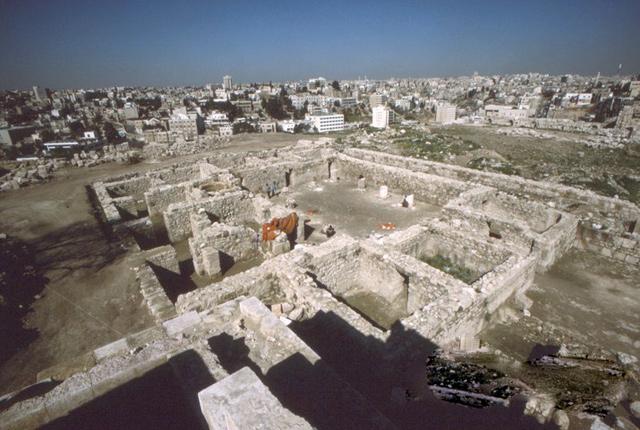- Local News
- Sun-2021-08-01 | 03:09 pm

Nayrouz News Agency :
Amman should be proud of being the only modern Arab capital that can show visitors a complete urban fabric with all the functional and representative components of an Early Islamic palatine city, according to a Spanish archaeologist.
"The core of the city was a palace on Jabal Qala,” said Associate Professor at the School of Architecture and Built Environment at the German-Jordanian University Ignacio Arce during a lecture titled "From Philadelphia to Amman: Architecture, Urban Planning and Society in Early Islamic Period” organised by the French institute Ifpo on Monday.
The conquest of Amman by General Yazid in 635AD, during the rule of Caliph Omar (584-644 AD) changed the history of the city and its urban configuration, Arce said. He noted that Amman became a capital of the Balqa region; the economic hub and a significant political centre.
Furthermore, the discovery of the Umayyad palatine complex at the Amman Citadel was initiated through research conducted between 1995 and 2001, Arce said, adding that it highlighted "a unique urban complex”.
Arce said that the combination of urban and architectural provides researchers with the unique opportunity to analyse the political meaning and the will that gave birth to such complex social relationships.
Consequently not only a new visual culture starts to emerge, but also a new palatine urbanism.
At the Amman Citadel researchers can observe how this model started to move from a different one that would mark the later evolution of Islamic palatine architecture.
"Islam is essentially an urban religion and it was an urban culture as well, developed under the new Muslim rules,” Acre stressed.
Rulers maintained and refurbished cities, adapting to their need the pre-existing cities from Late Antiquity, while creating several new cities on their own, he added.
Even pre-Islamic Arabian culture recogniaed the importance of cities as trade centres, he said.
This recognition of cities as centres of trade was at the base of traditional Arab culture, Acre said.
"This fundamental concept was at the base of traditional Arab culture, and it was given priority when the new Muslim rulers gained control over such a vast extension of territory, which without this key and compulsory principle could not have been kept under control.
"Hence, therein also the importance of the progressive sedentarisation of previously solely nomadic tribes by means of the settlement of these tribal groups in the newly conquered lands,” Arce pointed out.
The discovery at the Amman Citadel of all of the main components of the city (palace, suq square, congregational mosque, bathroom) allow us to attempt a proper interpretation of the complex, something that unfortunately is not possible in other cases of the adaptive seizure of cities, Arce continued,
He added that "all of these elements demonstrate how this new city was designed on the basis of a comprehensive plan that would integrate all of the elements into a global and coherent plan.
"As competing symbols of power, royal palaces were often abandoned or destroyed by successive powers, unlike religious monuments that generally continued to be used after undergoing modifications to accommodate religious differences. In our case the aforementioned lack of religious links with any specific building led to a total re-arrangement of the new palatine complex in the capital of the Balqa,” Arce noted.









